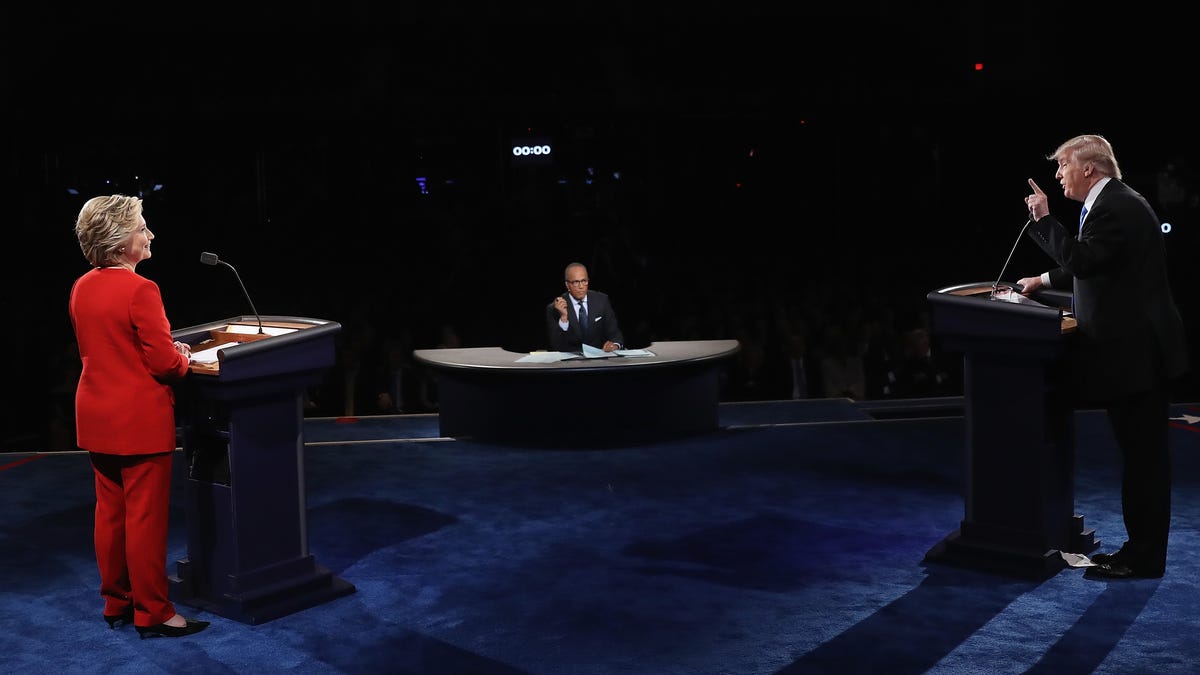Clinton, Trump schooled by Twitter on debate tactics
Social media responds as the presidential candidates spar over everything from cybersecurity to taxes.

Big Data was a big part of the first big debate.
Hillary Clinton and Donald Trump battled it out Monday night at Long Island's Hofstra University in the first of three debates as they race to become the next US president. The candidates sparred over "America's direction," "achieving prosperity" and "securing America" -- basically anything -- in a face-off that was expected to draw more than 100 million viewers, an audience on par with that of the Super Bowl.
During the spirited, 95-minute debate, Trump, 70, said he has the "winning temperament" to be president and claimed his Democratic rival doesn't have the "stamina" for the position after being asked to clarify his comments that she didn't have a "presidential look." Clinton fired back, saying the Republican candidate could challenge her on stamina after he completed the hectic traveling schedule she followed as secretary of state, and she countered that he wasn't prepared to debate or to be commander in chief.
"You know what else I'm prepared for? I'm prepared to be president," Clinton, 68, said. "And that's a good thing."
With the race in a virtual dead heat according to one poll, the debate provoked an outpouring of political expression on Twitter, Facebook, Instagram and other social media. Knowing that social media would be key to voter sentiment, Clinton's team sent supporters an email asking them to "advocate on every online platform on the night she goes head to head with Trump." Meanwhile, Trump bought a Snapchat filter. Pollsters said that Clinton won Monday's event.
The flood of data from social media will likely paint a better picture than what can be culled from tweets and likes. Companies like Fastly, L2 Political, Cambridge Analytica, NationBuilder, NGP VAN and TargetedVictory extract signals from piles of big data scraped from the social web, notably Twitter, Facebook, Instagram and YouTube. Both campaigns have internal teams that process these signals, using the data to shape messaging and their get-out-the-vote strategies. And that's important because of how Trump and Clinton have used new media strategies, and even Pokemon Go, to reach voters.
"A lot of people are looking at this campaign, socially speaking, and want to compare this to the 2012 and 2008 [presidential] races," said Kellan Terry, a data analyst for Brandwatch, which measures social media reaction. "But there's really not one to be made. All conventional wisdom is gone."
Fastly said it saw a spike of 1.5 million requests per second, an increase of 3,000 percent, in media sites with fact-checkers when Clinton urged viewers to go to her website and follow along with the fact-checkers while she criticized Trump for alleged inaccuracies about jobs and taxes. Social media also saw a 25 percent increase when Clinton dissed Trump's tax policies calling them, "Trumped-up trickle down" economics, which became the hashtag #TrumpedUpTrickleDown and began trending early on Twitter, Fastly added.
Other popular trending terms on Twitter included "#debatenight" with 2.4 million tweets, "Donald Trump," with more than 2.1 million, "president" (1.1 million) and "The Donald" (1 million). "Fact check" also resonated with users, registering more than 326,000 tweets.
Ratings agency Nielsen said Twitter, which live streamed Bloomberg TV's coverage of the debate, saw 17.1 million engagements from 2.7 million people about the political joust.
Social intelligence firm Sysomos saw similar results by scraping Twitter in real time during and immediately following the debate. Its tool applies Boolean searches -- complex conditional queries -- to suss trending content.
Clinton was mentioned 1,321,073 times in tweets during the debate. Among her top trending quotes was her "Trumped-up trickle down" remark. The quote was mentioned 23,436 times during and immediately after the debate, according to Sysomos.
Other trending quotes from Clinton included, "I know you live in your own reality," a reference to Trump's reality TV past, and, "maybe he's not as rich as he says he is," which Clinton said while criticizing her rival for not releasing his tax returns.
Trump was mentioned 1,707,617 times in tweets during the debate. Among his top trending quotes was a slam of Clinton's national security chops, in which he said she's been fighting ISIS her "entire adult life." The quote was mentioned 31,557 times, according to Sysomos.
Trump was also quotable when he said he didn't mean to sound "braggadocios" while discussing his personal wealth and business success. The internet also picked up on his multiple references to "stop and frisk," a policy that's been deemed unconstitutional, while debating crime prevention and racial profiling.
He may not have fared well during the debate, but Trump, whose Twitter handle is @realDonaldTrump, was definitely talked about. He captured 62 percent of the debate share of conversation -- conversation in the general sense, not approval or disapproval -- on the social network compared with the 38 percent held by Clinton, whose Twitter handle is @HillaryClinton.
The effect of real-time social media on the debates is still being measured, said Dan Franklin, a political science professor at Georgia State University in Atlanta.
That's because, according to Brandwatch's Terry, the candidates are on a stage under bright lights, unaware of how their sentiment is playing on social media and whether it will lead to a positive or negative trend -- or a hashtag.
"They won't benefit immediately from the social analysis, but they surely will review it later," Terry said. "They will get to see for themselves and say, 'In this moment I did very well,' and 'This is something I need to work on.'"
Franklin agrees. "There will be no 'Hail Mary's' or 'running out the clock,' at least for now," he said, using some football analogies. "However, in the future, it might be useful for candidates to think in those terms."
First published September 26, 9:01 p.m. PT.
Update, September 28 at 3:58 p.m.: Adds Nielsen data on Twitter.
CNET freelancer Eric Mack contributed to this report.



